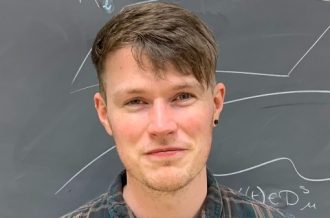Why study Mathematics
Mathematics is one of the purest forms of thought and its relevance to our everyday lives is fundamental. While its origins dates back to ancient Greece, mathematics continues to underpin key areas of human endeavour and industry, from engineering to construction, economics to software development and space travel. For many, the appeal of mathematics – and what makes it unique – is its basis in proof. Unlike those working in any other discipline, mathematicians are able to make statements with absolute certainty. Once a theory is proved, it is proved forever and cannot be refuted. Pythagoras’ famous theorem for measuring the sides of right-angled triangles is as true today as it was when he formulated it in the sixth century BC.
As a student, you will progress from the foundations of school Mathematics all the way to the threshold of ground-breaking new research in the field. You will gain a firm grounding in the key areas of mathematics, while developing the ability to invent, criticise and perfect mathematics for yourself. You will learn to think rigorously about questions and to solve problems – invaluable skills that can be transferred to any area of life and any job you hold in future.
There is a variety of ways to study Mathematics at Maynooth; Mathematical Studies, Applied Mathematics and Pure Mathematics, all available as either Single Major or Double Major degree subjects. This range of choice helps students ensure that they can match their degree to their career aspirations, whatever they are.
Every maths programme contains a mixture of procedural elements ("How do we do this?") and conceptual understanding ("Why does this work?"), with creativity an important ingredient in both. Mathematical Studies concentrates more on the "How", while Pure Maths delves much more into the "Why" and gives greater scope for creativity.
For most students, BA Maths Studies (within MH101) and the closely related BSc Applied Maths (within MH201) are the best choices. These are primarily aimed at students who enjoy mathematics, but who might have difficulty with a more proof-oriented degree. Students see a broad range of mathematics topics, with an emphasis more on calculation than proof.
There are several Pure Maths degrees mainly differing in what other subject(s) are taken: Pure Maths in Arts (MH101) and the accelerated BSc degrees in Computational Thinking (MH603) and Theoretical Physics and Maths (MH206). All are suited for the very best maths students, and so all require a minimum of a H2 in Leaving Cert Maths. The focus is on giving students a deeper understanding of mathematics, and on constructing arguments that establish truth.
One other option that may appeal to students wishing to become teachers is the MH212 programme (which has three streams: Science/Maths/Maths and Computer Science, each with Education). Here, you can get the equivalent of a BSc and PME after 5 years or you can graduate with a BSc only in 4 years. This 5-year programme saves one year compared with the typical 4+2 years for separate BSc and PME programmes, and guarantees that a student is accepted into a PME-equivalent programme from the start of their degree. The maths in MH212 is similar in style to Maths Studies.


